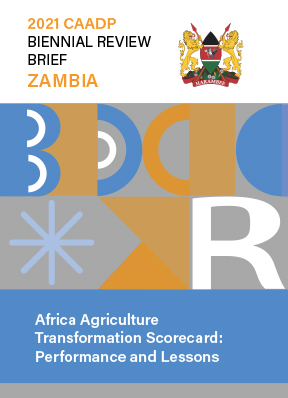Africa Agriculture Transformation Scorecard: performance and lessons. Zambia
Abstract
The Malabo Declaration on accelerated agricultural growth and transformation for shared prosperity and improved livelihoods is a set of goals that were adopted by Heads of State and Government of the African Union in 2014 in Malabo, Equatorial Guinea (AUC 2014). To translate the seven Malabo commitments into results, a call for action was made by the Heads of State and Governments, by calling upon the AU Commission and the NEPAD Planning and Coordinating Agency, in collaboration with partners, to initiate a review process to be conducted on a biennial basis starting 2017, with an objective of tracking, measuring, and reporting progress towards achieving the Malabo Declaration commitments by 2025.
Three Biennial Reviews (BR) have been conducted—the inaugural BR in 2017, the second BR in 2019, and the third and most recent BR in 2021. This brief draws on the third BR report to summarize the performance of Zambia in the third BR, in comparison with its performance in the previous BR cycles. The brief takes a look at challenges and lessons from the third BR, reviews policy, programmatic, and investment changes in Zambia resulting from the three BRs and concludes by highlighting the measures Zambia needs to take if it is to meet all seven Malabo commitments by 2025.
While the country showed signs of improvement in four of the seven commitment areas between the second and third BR cycles, it is not on track to achieve them by 2025.
A key recommendation from the analysis is for the government to increase resources to support known key drivers of agricultural growth—these include agricultural research and development, agricultural extension services, agricultural market information, irrigation for smallholder farmers, and feeder roads. All have great potential to stimulate agricultural growth.

